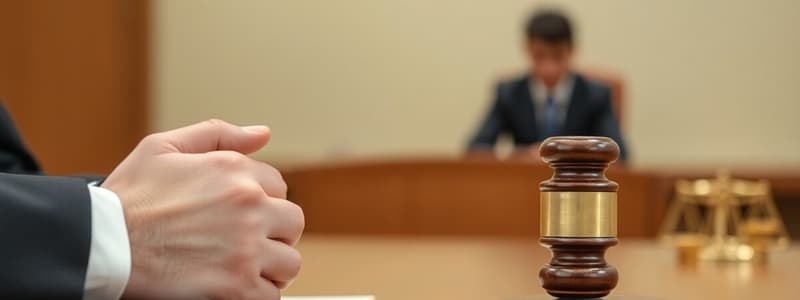Podcast
Questions and Answers
What must the court do if a plea in mitigation is deemed qualified?
What must the court do if a plea in mitigation is deemed qualified?
- Reopen the case for further hearings
- Reject the plea in mitigation (correct)
- Consider it valid and proceed with sentencing
- Refer the matter to a higher court
Under what condition can the court compound antecedents for sentencing purposes?
Under what condition can the court compound antecedents for sentencing purposes?
- At the discretion of the judge alone
- After a mandatory waiting period
- Only if the prosecution agrees
- With the consent of both parties involved (correct)
What is a necessary condition for the court to accept a retraction of a guilty plea?
What is a necessary condition for the court to accept a retraction of a guilty plea?
- Retraction must occur before sentencing
- A unanimous decision from the jury
- There must be valid and sufficient grounds (correct)
- The accused must prove innocence
What does s318 CPC specifically allow regarding sentencing?
What does s318 CPC specifically allow regarding sentencing?
Which of the following is considered an antecedent under s2(1) CPC?
Which of the following is considered an antecedent under s2(1) CPC?
What must occur before any plea in mitigation is presented to the court?
What must occur before any plea in mitigation is presented to the court?
What is the role of s147 CPC in sentencing?
What is the role of s147 CPC in sentencing?
What happens if a guilty plea is retracted and subsequently the accused is found guilty?
What happens if a guilty plea is retracted and subsequently the accused is found guilty?
What does the Criminal Case Management System (CCMS) facilitate?
What does the Criminal Case Management System (CCMS) facilitate?
According to s319(1)(b) CPC, what are the conditions for fine payment?
According to s319(1)(b) CPC, what are the conditions for fine payment?
What must occur for the court to proceed with accepting a plea of guilty?
What must occur for the court to proceed with accepting a plea of guilty?
What is required in the Statement of Facts (SOF) when pleading guilty?
What is required in the Statement of Facts (SOF) when pleading guilty?
In a scenario where an accused person wishes to contest a material fact, what must occur?
In a scenario where an accused person wishes to contest a material fact, what must occur?
What is the role of the prosecution when a very fundamental fact in dispute arises?
What is the role of the prosecution when a very fundamental fact in dispute arises?
What is the primary purpose of the one-transaction rule in sentencing?
What is the primary purpose of the one-transaction rule in sentencing?
What happens when an accused decides to withdraw the guilty plea during proceedings?
What happens when an accused decides to withdraw the guilty plea during proceedings?
Under what condition will a court decline to record a plea of guilty?
Under what condition will a court decline to record a plea of guilty?
What limitation exists regarding the accused's ability to appeal upon pleading guilty?
What limitation exists regarding the accused's ability to appeal upon pleading guilty?
What should be considered if a crucial fact affecting sentencing is not acknowledged?
What should be considered if a crucial fact affecting sentencing is not acknowledged?
What legal duty exists between the parties regarding the Statement of Facts?
What legal duty exists between the parties regarding the Statement of Facts?
Flashcards
Guilty Plea Challenges
Guilty Plea Challenges
If an accused person or the prosecution disputes a material fact in a case, or the accused person changes their mind about a guilty plea, a procedure needs to be followed to consider their concerns.
Accused Understanding
Accused Understanding
Before accepting a guilty plea, the accused must comprehend the nature of the charges and the possible penalties.
Statement of Facts
Statement of Facts
A detailed description of the alleged crime, containing all critical elements of the charged offence, that must be agreed upon by both parties.
Validity of Guilty Plea
Validity of Guilty Plea
Signup and view all the flashcards
Newton Hearing
Newton Hearing
Signup and view all the flashcards
Burden of Proof (Newton Hearing)
Burden of Proof (Newton Hearing)
Signup and view all the flashcards
Charges Taken Into Consideration (TIC)
Charges Taken Into Consideration (TIC)
Signup and view all the flashcards
One-Transaction Rule
One-Transaction Rule
Signup and view all the flashcards
Consecutive Sentences
Consecutive Sentences
Signup and view all the flashcards
Concurrent Sentences
Concurrent Sentences
Signup and view all the flashcards
Compounding antecedents
Compounding antecedents
Signup and view all the flashcards
Plea in mitigation
Plea in mitigation
Signup and view all the flashcards
Qualified plea in mitigation
Qualified plea in mitigation
Signup and view all the flashcards
Retraction of guilty plea
Retraction of guilty plea
Signup and view all the flashcards
Harsher sentence (retraction)
Harsher sentence (retraction)
Signup and view all the flashcards
Agreed Statement of Facts (ASOF)
Agreed Statement of Facts (ASOF)
Signup and view all the flashcards
Criminal Case Management System (CCMS)
Criminal Case Management System (CCMS)
Signup and view all the flashcards
Deferment of sentence
Deferment of sentence
Signup and view all the flashcards
Withdrawal of charges
Withdrawal of charges
Signup and view all the flashcards
Sentencing Advisory Panel
Sentencing Advisory Panel
Signup and view all the flashcards
Study Notes
Pleading Guilty Procedure
- Accused challenges element of charge: Procedure outlines what happens when the accused challenges an element of the charge.
- Challenges material to sentencing: Procedure covers situations where a fact is challenged that directly affects the sentencing.
- Changes mind during plea: Procedure addresses scenarios where an accused changes their mind about pleading guilty mid-process.
Procedure at Plea Hearings
- Initial Charges: Charges the prosecution intends to pursue are initially read to the accused.
- Remaining Charges: Remaining charges are temporarily put on hold.
- Confirmation of Guilty Plea: The court confirms the accused's willingness to plead guilty and their understanding of the implications.
- Statement of Facts (SOF): The prosecution presents the Statement of Facts.
- Accused's Admission: The accused confirms their admission to the SOF without qualification.
- Conviction based on SOF: The court convicts the accused based on the facts in the SOF.
- Consent for Remaining Charges: Consent is obtained from the accused to include other charges for consideration during sentencing.
Section 227(1)-(2), CPC - Procedure if Accused Pleads Guilty
- Plea Recording: If an accused pleads guilty (whether originally or amended), the plea is recorded, and the accused can be convicted.
- Accused Understanding (No Advocate): The court confirms the accused understands the nature and consequences of their plea and the punishment for the offense, and intends to admit to the offence without any qualifications.
- Accused Understanding (With Advocate): The court verifies that the accused's advocate confirms that the accused understands the nature and consequences of their plea, and intends to admit the offence without qualifications.
Statement of Facts (SOF)
- Essential Ingredients: The SOF must include all essential elements of the crime.
- Peripheral Facts: The accused does not need to admit to irrelevant details.
- Reasonable Efforts: Parties attempt to resolve facts before a guilty plea hearing.
- Legal Duty to Agree: Parties have a legal obligation to agree on SOF.
- Lack of SOF Sufficiency: If the SOF is insufficient, the court declines to record a guilty plea.
Validity of Plea
- Knowledge of Offence: Accused must understand the specifics of the offense.
- Consequences of Plea: Accused must know potential consequences.
Newton Hearing
- Important Facts: A Newton Hearing is a crucial procedure to ensure that material facts, impacting sentencing, are considered if there is dispute.
- Discretion for Judge: The Court has the discretion to decide on whether to hear disputed facts relating to sentencing.
Charges Taken Into Consideration (TIC)
- Consecutive Sentencing: Rules for consecutive sentences when several charges are involved.
Antecedents
- Criminal Record Definition: Definition of "criminal record'' as per legislation.
- Consideration in Sentencing: Records can affect sentencing.
- Victim Impact Statements: Victim impact statements may be presented.
Address on Sentence/Mitigation
- Hearing Plea: The court hears pleas for mitigation of the sentence.
- Prosecutorial Right: The prosecution has the right to respond.
- Qualified Plea Rejection: The court can reject mitigation if the plea is qualified.
- Prohibition on Insulting: Legal practitioners can't make scandalous or insulting allegations when presenting a plea in mitigation.
Pronouncement of Sentence
- Immediate Effect: The sentence's effective date is usually immediate unless specified otherwise.
Factors to Defer Sentence
- Consideration Factors: The court considers adjournment history, the seriousness of the offense, the risk of reoffending, and the accused's attendance in court.
Fines
- Imposition of Fines: The amount of a fine depends on the specific laws and the court's discretion.
- Excessive Fines: Fines are required to be fair and balanced.
- Payment Methods: Fines can be paid through installments, and the court may order imprisonment if payment is not followed through.
Withdrawal of Remaining Charges
- Multiple Charges: If multiple charges are made against a single person, some charges may be withdrawn with prosecutorial and judicial consent.
Retraction of Guilty Plea
- Validity and Grounds: There must be valid grounds if the accused wishes to retract.
- Serious Injustice: The power to use this should be used sparingly to correct serious injustice.
Pre-Trial Negotiations
- Proceeded Charges: Accused may plead guilty to lesser charges, with other charges considered during sentencing.
- Agreed Statement of Facts (ASOF): Negotiations on ASOF and sentencing positions are subject to judicial discretion.
- Representing to AGC: Parties can communicate with the Attorney-General's Chambers.
- Criminal Case Management System (CCMS): Meetings are held in cases if trial is needed.
- Criminal Case Resolution: The Judge's perspective and decisions on sentencing.
Studying That Suits You
Use AI to generate personalized quizzes and flashcards to suit your learning preferences.




